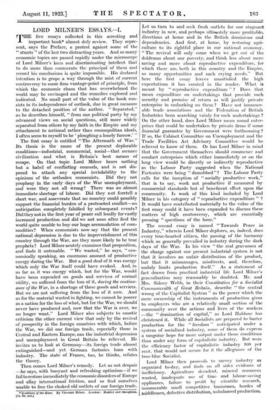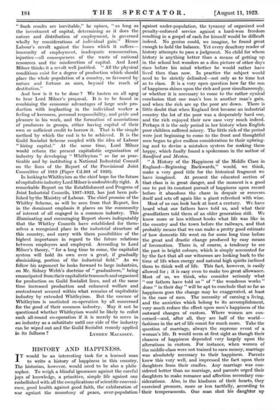LORD MILNER'S ESSAYS.—I.
THE five essays collected in this arresting and important book* almost defy review. They repre- sent, says the Preface, a protest against some of the " stunts " of the last two distracting years. And so many economic topics are passed rapidly under the microscope of Lord Milner's keen and discriminating intellect that to do more than enumerate the principal of them and record his conclusions is quite impossible. His declared intention is to grope a way through the mist of current controversy to some firm vantage-point of principle, from which the economic chaos that has overwhelmed the world may be envisaged and the remedies explored and indicated. No small part of the value of the book con- sists in its independence of outlook, due in great measure to the detached position of the author. " Separated," as he describes himself, " from one political party by my advanced views on social questions, still more widely separated from others by my faith in the Empire and my attachment to national rather than cosmopolitan ideals, I often seem to myself to be ploughing a lonely furrow.' " The first essay is entitled ",The Aftermath of War." Its thesis is the cause of the present deplorable conditions—industrial, commercial, social—that menace civilization and what is Britain's best means of escape. On that topic Lord Milner hears nothing but a babel of conflicting counsels, and is not dis- posed to attach any special inviolability to the opinions of the orthodox economists. Did they not prophesy in the early 'days of the War unemployment, and were they not all , wrong? There was an almost immediate shortage of labour. Did they not foretell a short war, and asseverate that no country could possibly support the financial burden of a protracted conflict—an anticipation completely falsified by subsequent events? Did they not in the first year of peace call loudly for vastly increased production and did we not soon after find the world.quite unable to buy our huge accumulation of com- modities? When economists now say that the present national depression is .due to the impoverishment of this country through the War, are they more likely to be true prophets? Lord Milner acutely examines that proposition, and finds it untenable. " We wasted," he says, " eco- nomically speaking, an enormous amount of productive energy during the War. But a good deal of it was energy which only the War itself could have evoked. And, in so far as it was energy which, but for the War, would have been expended on goods and services of normal utility, we suffered from the loss of it, during the continu- ance of the War, in a shortage of these goods and services. But we are not suffering from the loss of it now. And as for the material wasted in fighting, we cannot be poorer as a nation for the loss of what, but for the War, we should never have produced .and, now that the War is over, we no longer want." Lord Milner also subjects' to caustic criticism the other current view that only by the revival of prosperity in the foreign countries with which, before the War, we did our foreign trade, especially those in Central and Eastern Europe, can the industrial depression and unemployment in Great Britain be relieved. He invites us to look at Germany—its foreign trade almost extinguished—and yet German factories hum with industry. The state of France, too, he thinks, refutes the theory.
Then comes Lord Milner's remedy. Let us not despair —he says, with buoyant and refreshing optimism—if we fail to restore immediately the economic disorders of Europe and allay international friction, and so find ourselves unable to free the choked old outlets of our foreign trade.
• Qougions of Om Hour. By Viscount Milner. London : Hodder and Stoughton. [7a. dd. netj Let us turn to and seek fresh outlets for our stagnant industry in new, and perhaps ultimately more profitable, directions . at home and in the British dominions and dependencies. And first, at home, by restoring agri- culture to its rightful place in our national economy. " The revival will only come when we get out of the doldrums about our poverty, and think less about mere saving and more about reproductive expenditure, for which there are, both in this country and the Empire, so many opportunities and such crying needs." But here the first essay leaves unsatisfied the high expectations it has created in the reader. What is meant by " reproductive expenditure " ? Does that mean expenditure on undertakings that provide such security and promise of return as will justify private enterprise in embarking on them ? Have not innumer- able trade associations and the Federation of British Industries been searching vainly for such undertakings ? On the other hand, does Lord Milner mean sound enter- prises that could be undertaken by private firms if some financial guarantee' by Government were forthcoming ? If so, the Cabinet Committee on Unemployment and the Trade Facilities Act Advisory Committee would be relieved to know of them. Or has Lord Milner in mind that the Government themselves should commence and conduct enterprises which either immediately or on the long view would be directly or indirectly reproductive as the Labour Party suggested when the National Factories were being " demobbed"? The Labour Party calls for the inception of " socially productive work," that is to say, work not productive if measured by commercial standards but of beneficent effect upon the community. Is work of this kind included by Lord Milner in his category of " reproductive expenditure " ? It would have contributed materially to the value of the first essay could it have been expanded to discuss these matters of high controversy, which are essentially pressing " questions of the hour."
The second essay is named " Towards Peace in Industry," wherein Lord Milner deplores, as, indeed, does every true-hearted eitizen, the passing of the harmony which so generally prevailed in industry during the dark days of 'the' War. In his view " the. real gravamen of the charge against our present industrial system is not that it involves an unfair distribution of the product, but that it mismanages, misdirects, and, therefore, unduly limits production itself." As a statement of fact drawn from practical industrial life Lord Milner's generalization may reasonably be doubted. Mr. and Mrs. Sidney Webb, in their Constitution for a Socialist Commonwealth of Great Britain, describe " the central wrong of the Capitalist System " as the power which the mere ownership of the instruments of production gives to employers who are a relatively small section of the community over the actions and lives of the workers —the " domination of capital," as Lord Haldane has christened it. While all Socialists are prepared to barter production for the " freedom " anticipated under a system of socialized industry, some of them do express a sanguine hope for more output under those conditions than under any form of capitalistic industry. But were the efficiency factor of capitalistic industry 100 per cent. that would not secure for it the allegiance of the true-blue Socialist.
Lord Milner then proceeds to survey industry as organized to-day, and finds on all sides evidence of inefficiency. Agriculture decadent, mineral resources wasted, inadequate use of time and labour-saving appliances, failure to profit by scientific research, innumerable small competitive businesses, hordes of middlemen, defective distribution, unbalanced-production. " Such results are inevitable," he opines, " as long as the investment of capital, determining as it does the nature and distribution of employment, is governed wholly by considerations of individual gain." Hence Labour's revolt against the losses which it suffers— insecurity of employment, inadequate remuneration, injustice—all consequences of the waste of national resources and the misdirection of capital. And Lord Milner thinks it a revolt well justified. " All the physical conditions exist for a degree of production which should place the whole population of a country, so favoured by nature and fortune as ours, beyond the reach of destitution."
And how is it to be done ? We hasten on all agog to hear Lord Milner's proposal. It is to be found in combining the economic advantages of large scale pro- duction with implanting in the individual worker a feeling of keenness, personal responsibility, and pride and pleasure in his work, and the formation of associations of producers in groups, either having capital of their own or sufficient credit to borrow it. That is the simple method by which the end is to be achieved. It is the Guild Socialist Scheme coupled with the idea of Labour " hiring capital." At the same time, Lord Milner would reform the present capitalistic organization of industry by developing "Whitleyism " so far as prac- ticable and by instituting a National Industrial Council on the lines of the Report of the Provisional Joint Committee of 1919 (Paper Cd.501 of 1920).
In looking to Whitleyism as the chief hope for the future of capitalistic industry Lord Milner is undoubtedly right. A remarkable Report on the Establishment and Progress of Joint Industrial Councils, 1917-1922, has just been pub- lished by the Ministry of Labour. The chief promise of the Whitley Scheme, as will be seen from that Report, lies in the dominant emphasis it places on the community of interest of all engaged in a common industry. This illuminating and encouraging Report shows indisputably that the Whitley Councils have established for them- selves a recognized place in the industrial structure of this country, and carry with them possibilities of the highest importance in regard to the future relations between employers and employed. According to Lord Milner's theory, " for a long time to come, the capitalist system will hold its own over a great, if gradually diminishing, portion of the industrial field." As we follow his argument he looks forward to large industries, on Mr. Sidney Webb's doctrine of " gradualness," being emancipated from their capitalistic trammels and organized for production on Guild Socialist lines, and at the same time increased production and enhanced welfare and contentment secured within what remains of capitalistic industry by extended Whitleyism. But the essence of Whitleyism is unstinted co-operation by all concerned for the good of their common industry. May it not be questioned whether Whitleyism would be likely to enlist such all-round co-operation if it is merely to serve in an industry as a substitute until one side of the industry can be wiped out and the Guild Socialist remedy applied



































 Previous page
Previous page